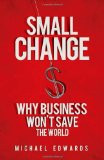
Small Change: Why Business Won't Save the World
Michael Edwards
127 pages, Berrett-Koehler Publishers, 2010
A mandarin, according to Webster’s Dictionary, is a “powerful official or senior bureaucrat, especially one perceived as reactionary or secretive.” Michael Edwards has had a long career that has featured top positions at Oxfam, Save the Children, the World Bank, and 10 years at the Ford Foundation. Although it is clear he is not a secretive fellow, those beliefs have been poured into his new book, Small Change.
Small Change is a follow-up to, and an amplification of, Edwards’ 2008 monograph, Just Another Emperor? The Myths and Realities of Philanthrocapitalism, which was a hives-like reaction to the book Philanthrocapitalism: How Giving Can Save the World, by The Economist’s Matthew Bishop and Michael Green (who interestingly enough has had a career similar to Edwards’).
Edwards makes no bones about what Small Change is about: “The claim that business thinking can save the world is a convenient myth for those who occupy positions of great wealth and power; and the constant celebration of rich and famous individuals is a dangerous distraction from the hard, public work of finding solutions, all of us together.” Edwards further states in the preface, “Social transformation is not a job to be left to market forces or to the whims of billionaires.”
Clearly, Edwards has a bee in his bonnet about Bono, Bill, and Buffett, and their role in the world—especially in the developing world. Edwards also sees the issue in black and white: Either you believe that business thinking is good and will save the world or you don’t. The reality is that the world is quite complex and is also quite gray. Given his vast experience, it is shocking that Edwards sees the world as starkly as he does.
Edwards wants the reader of this slim volume to firmly believe that business and business leaders have little to no role in solving social problems. Business leaders are too tactical; are far too focused on outcomes; and really don’t, well, feel. “The profit motive is not a dirty word,” writes Edwards, “but is it a different word from solidarity and caring with no expectation of return.” He goes on to describe this division and relies on stalwarts like Adam Smith and Milton Friedman to reinforce his point of view. For a seasoned reader this all feels a bit “been there, done that.” We have heard these antibusiness arguments before, and in 2010 they just don’t resonate as they once did.
In the 21st century, corporations of all shapes and sizes know that they cannot risk operating unilaterally. Businesses certainly cannot ignore the concerns of their shareholders, nor can they ignore the concerns of their other stakeholders—including civil society. Even Edwards quotes Lee Scott, CEO of Wal-Mart Stores, “The question of how to assure that American capitalism creates a decent society is one that will engage all of us in the years ahead.” Edwards also notes that there are philanthrocapitalists like Mario Marino who are trying and, in the reviewer’s opinion, succeeding because they understand what it takes to find the balance between achieving outcomes and impact with the need to embrace social and political dynamics.
Edwards wants you to believe that philanthrocapitalism is completely misguided. He also wants business-minded donors to leave the messy work of social change to the professionals—that the mandarins of the NGO world can take care of it. Edwards wishes business and its leaders would just leave civil society alone. And he wishes that business would stay within the boundaries of its sector and reform and behave itself.
Perhaps it is only fair then to have the last words of this review come from Bishop and Green: “If philanthrocapitalism is to succeed, it will be because these philanthropists take impact seriously and apply their business talents just as rigorously as they did when they made their money. That is easier said than done, not least because philanthropy lacks many of the market forces that keep businesspeople disciplined, focused on success, and willing to make the tough decisions necessary to survive and prosper.”
Edwards tries to update an old argument and make a plea to leave the heavy lifting to committed people who know better. In the end, he fails to make a convincing argument on either point—an unfortunate spot for any well-meaning mandarin to be in.
Doug Bauer is the executive director of the Clark Foundation. He has more than 21 years of experience in the field of philanthropy and has worked in both the private and nonprofit sectors. He is coauthor of Philanthropy’s New Passing Gear: Mission-Related Investing and teaches at the University of Pennsylvania and Columbia Business School.

